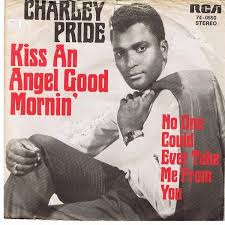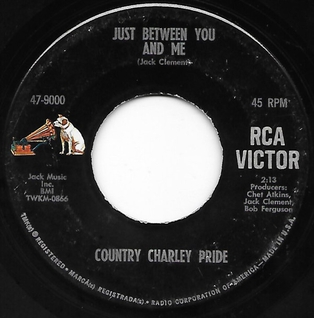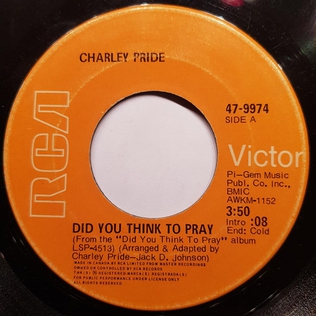Related Research Articles
"All I Have to Offer You " is a song written by Dallas Frazier and A.L. "Doodle" Owens, and recorded by American country music artist Charley Pride. It was released in June 1969 as the first single from his compilation album The Best of Charley Pride.

"Kiss an Angel Good Mornin'" is a song written by Ben Peters, and recorded by American country music artist Charley Pride. It was released in October 1971 as the first single from the album Charley Pride Sings Heart Songs. The song has since become one of his signature tunes and was his eighth song to reach number one on the country charts. It was also Pride's only single to reach the Top 40 on the pop charts, peaking at #21 on the Billboard Hot 100, and also went into the Top Ten of the Adult Contemporary charts. It also reached #19 on the U.S. Cash Box Top 100. The song spent four months on the pop chart, longer than any of his other hits. Billboard ranked it as the No. 74 song for 1972.
"(I'm So) Afraid of Losing You Again" is a song written by Dallas Frazier and A.L. "Doodle" Owens, and recorded by American country music artist Charley Pride. It was released in October 1969 as the first single from the album Just Plain Charley. The song was Pride's second number one on the country charts. The single stayed at number one for three weeks and spent a total of 15 weeks on the country charts.

"It's Gonna Take a Little Bit Longer" is a song written by Ben Peters, and recorded by American country music artist Charley Pride. It was released in May 1972 as the first single from the album A Sunshiny Day with Charley Pride. The song was Pride's ninth number one on the country chart. The single stayed at number one for three weeks and spent a total of fourteen weeks on the country chart.
"A Shoulder to Cry On" is a song written by Merle Haggard, and recorded by American country music artist Charley Pride. It was released in January 1973 as the first single from the album Sweet Country. The song was Pride's eleventh number one on the country charts. The single stayed at number one for a single week and spent thirteen weeks on the country chart.
"I Ain't All Bad" is a song written by Johnny Duncan, and recorded by American country music artist Charley Pride. It was released in March 1975 as the first single from his album Charley. The song peaked at number 6 on the Billboard Hot Country Singles chart. It also reached number 1 on the RPM Country Tracks chart in Canada.

"Mississippi Cotton Picking Delta Town" is a song written by Harold Dorman and George Gann, and recorded by American country music artist Charley Pride. It was released in August 1974 as the first single from his album Pride of America. The song peaked at number 3 on the Billboard Hot Country Singles chart. It also reached number 1 on the RPM Country Tracks chart in Canada.
"All His Children" is a song recorded by American country music artist Charley Pride with music by Henry Mancini. It was released in January 1972 and was the theme of the film Sometimes a Great Notion. The song peaked at number 2 on the Billboard Hot Country Singles chart. It also reached number 1 on the RPM Country Tracks chart in Canada.
"Shouldn't It Be Easier Than This" is a song written by John Jarrard and Rick Giles, and recorded by American country music artist Charley Pride. It was released in October 1987 as the first single from his album I'm Gonna Love Her on the Radio. The song peaked at No. 5 on the Billboard Hot Country Singles chart. It was Pride's 52nd and final Top 10 hit on Billboard country music charts.
"The Power of Love" is a song written by Gary Nicholson and Don Cook, and recorded by American country music artist Charley Pride. It was released in May 1984 as the first single from his album Power of Love. The song peaked at number 9 on the Billboard Hot Country Singles chart.
"Missin' Mississippi" is a song written by Byron Gallimore, Blake Mevis and Bill Shore, and recorded by American country music artist Charley Pride. It was released in September 1984 as the third single from the album Power of Love. The song became a top 40 hit on the Billboard country chart.

The discography of American country music artist Charley Pride contains 75 singles, one other charting song, two promotional singles, one featured single and 11 music videos. Pride signed his first recording contract with RCA Victor in 1966. His first two singles failed to become hits. His third single, "Just Between You and Me," became a hit when it reached the top ten of the country charts. Pride had several more top ten hits over the next several years until he had first chart-topper in 1969. The single, "All I Have to Offer You ," reached number one on the Billboard Hot Country Songs chart and spent 17 weeks charting. This was followed by five more number one hits, including "Is Anybody Goin' to San Antone." All of these singles also reached low-end positions on the Billboard Hot 100.

"Just Between You and Me" is a song written by Jack Clement, and recorded by American country music artist Charley Pride. It was released in September 1966 as the first single from the album Pride of Country Music. The song was Pride's third single and his first major hit as a recording artist.

"The Easy Part's Over" is a song written by Jerry Foster and Bill Rice, and recorded by American country music artist Charley Pride. It was released in April 1968 as the first single from the album Songs of Pride...Charley That Is. The song was Pride's seventh single and his fifth major hit as a recording artist.

"Let the Chips Fall" is a song written by Jack Clement, and recorded by American country music artist Charley Pride. It was released in September 1968 as the first single from the album The Sensational Charley Pride. The song was Pride's eighth single and his sixth major hit as a recording artist.

"Let Me Live" is a song written by Ben Peters. It was originally recorded by American country music artist Charley Pride. The song was produced by Jack Clement and was released as a single via RCA Victor Records in 1971. The song became a top 40 hit on the Billboard country chart and in Canada. It was Pride's only gospel recording to become a major hit.

"Did You Think to Pray" Recorded by Charley Pride, the song was produced by Jack Clement and was released as a single via RCA Victor Records in 1971. Many sites credit Charley Pride with writing the song with assistance from Jack D. Johnson, but the lyrics were written by Mary A. Pepper Kidder and the tune by William O. Perkins. The song became a minor hit on the Billboard country chart. It was later released on album of the same name.

"Down on the Farm" is a song written by Eddie Setser, John Greenebaum and Troy Seals, and recorded by American country music artist Charley Pride. It was released in January 1985 as the first single from his Greatest Hits, Volume 2 compilation album. The song became a top 40 hit on the Billboard country chart.
"Let a Little Love Come In" is a song written by Bob McDill, and recorded by American country music artist Charley Pride. It was released in May 1985 as the second single from his Greatest Hits, Volume 2 compilation album. The song became a top 40 hit on the Billboard country chart.

"Amy's Eyes" is a song written by Terry Brown and Jaima Prater Hunt, and recorded by American country music artist Charley Pride. It was released in December 1989 as the third single from the album Moody Woman. The song became the final top 40 hit of Pride's career.
References
- ↑ Whitburn, Joel (2013). Hot Country Songs: 1944-2012, Eighth edition. Record Research. p. 269.
- ↑ "Charley Pride Chart History (Hot Country Songs)". Billboard.